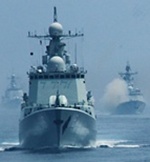Beijing warns Delhi to keep out of South China Sea
10 Aug 2016
Beijing is clearly keeping a wary eye on Prime Minister Narendra Modi's visit to Vietnam on his way to China to attend the G-20 summit next month.
 The stop is significant, as it comes amid raised tensions over the South China Sea (SCS), which are likely to be discussed when Chinese Foreign Minister Wang Yi visits India this week.
The stop is significant, as it comes amid raised tensions over the South China Sea (SCS), which are likely to be discussed when Chinese Foreign Minister Wang Yi visits India this week.
Modi's visit follows the 12 July international tribunal verdict that favoured the Philippines over China on rival claims in the SCS. Vietnam, which has similar claims over the controversial ''9-dash line'' has had a cautious reaction so far, but there is growing speculation that it would consider a similar case against China over its energy rich maritime boundaries that India also has a stake in.
An article in the state-owned Global Times indicated that Modi's Vietnam visit and India's reaction to the SCS ruling was on the top of the agenda.
''India may want to avoid unnecessary entanglement with China over the South China Sea debate,'' the article published on Tuesday said, adding that ''It is puzzling that India is focusing on the South China Sea issue at this moment, a move that might risk unnecessary side effects to Sino-Indian ties.''
The Prime Minister's Vietnam visit is being seen as a part of a perceptible shift in India's policy towards the SCS, with sharp references to China's aggression in the region made during Modi's visit to Japan, and his meeting with the Vietnamese Premier in Delhi in 2015, as well as in the Indo-US joint vision statement on the Asia-Pacific last year.
Since then, India and China's bilateral ties have deteriorated considerably over border tensions, China's support to Pakistan on terrorism issues and Pakistan-Occupied Kashmir, its stand on India's membership of the Nuclear Suppliers group and on Beijing's growing military ties in South Asia which India views with suspicion.
In June, defence minister Manohar Parrikar had met with the top Vietnamese leadership including the President, Prime Minister, and his counterpart defence minister General Ngo Xuan Lich in Hanoi where many of the details that could be announced during PM Modi's visit were discussed.
In particular, discussions over the possibility of supplying Vietnam the Indo-Russian Brahmos cruise missile are expected to be taken forward.
However officials cautioned that the talks over Brahmos, that have attracted wide international publicity, were more in the nature of ''discussions, not negotiations at this stage''.
Much of Vietnam's defence hardware, like the T-54/55 tanks and Mi 7/8 helicopters, trace back to Soviet era purchases, which also makes India particularly suited to Parrikar's aim of ''leading Vietnam's military modernization,''.
Sources said the finalisation of contracts under the $100 million credit line that was given to Vietnam when Premier Nguyen Tan Dung visited Washington in October 2014, is expected to be announced in September, sources said. During Parrikar's visit, the Vietnamese Border Guards had handed over a bid to Larsen and Toubro for patrol boats.
From Hanoi, Modi will fly to the resort town of Hangzhou where leaders of the world's top economies will gather for the G-20; he is expected to meet US President Barack Obama and Chinese President Xi Jinping.
Both meetings will mark their first since India failed to win membership of the Nuclear Suppliers Group, and the future of its NSG bid is likely to be discussed during both bilaterals.
Modi will then fly to Vientiane in Laos, to attend the ASEAN-India summit, as well as the East Asia summits on September 6-8, both important to the government's ''Look East, Act East policy'', officials said.


















